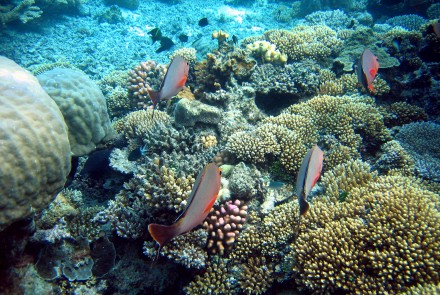How the Great Barrier Reef survived colder temperatutes

The Great Barrier Reef grew during the last ice age, even though the water temperatures were four to five degrees colder than today, a team of international scientists has found.
“It was right at the colder limit of what corals can take, but the reef grew and developed from there,” said Dr Helen McGregor, from ANU Research School of Earth Sciences.
The research helps scientists better understand the resilience of the world-heritage listed Great Barrier Reef and how it copes with changing ocean temperatures.
The news is cold comfort, however, as further and faster increases in temperatures are putting added stress on the Great Barrier Reef – the largest coral reef in the world. It is also suffering from ocean acidification, higher sediment loads and predators such as the crown of thorns starfish.
“The corals survived a gradual temperature rise from 20,000 to 12,000 years ago. However we don’t know if the reef will survive that change over the next 100 years,” Dr McGregor said.
“We do know that if summer temperature extremes occur more frequently, then corals are likely to bleach more regularly.”
Dr McGregor is part of the Integrated Ocean Discovery Program climate team, led by Dr Thomas Felis from Germany’s Centre for Marine Environmental Sciences, that drilled out cores from the reef in two locations, near Cairns and Mackay.
The historical record of the chemical makeup of the coral at the different locations has enabled them to reconstruct ocean temperature since the last ice age.
The Coral Sea experienced lower temperatures, and a large temperature gradient between Cairns and Mackay, which likely influenced the weather patterns in the region significantly, Dr McGregor said.
“Our results suggest the eastern Australian current was not bringing warmer water down the coast like it does today. The cooler waters point to less monsoonal rainfall in Queensland, something that’s been observed by other measurements, but haven’t been able to explain before,” Dr McGregor said.
 Follow
Follow